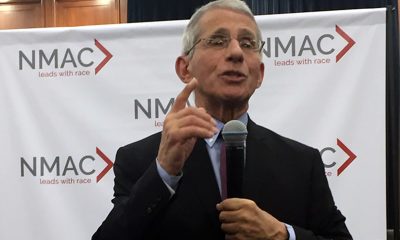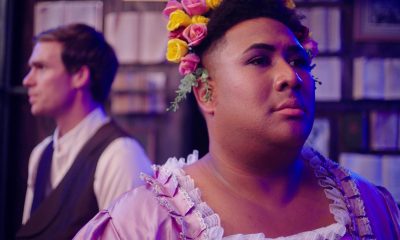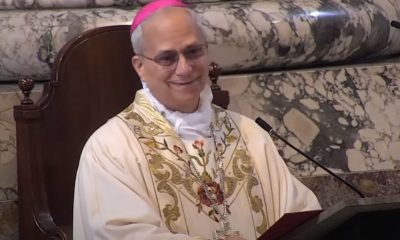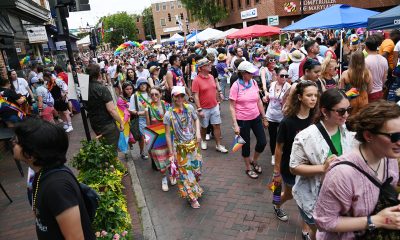a&e features
‘Boys Don’t Cry’ at 20: rethinking trans actors
Cis actress Hilary Swank won the Oscar playing a trans man but would it happen today?
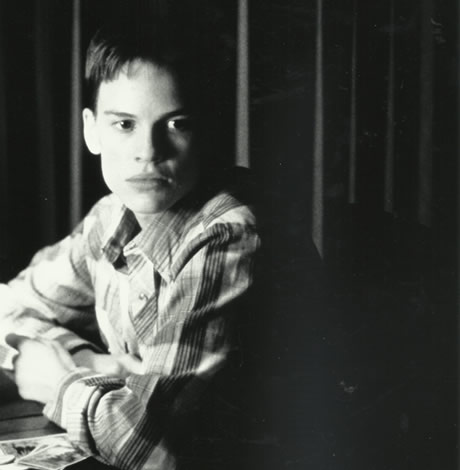
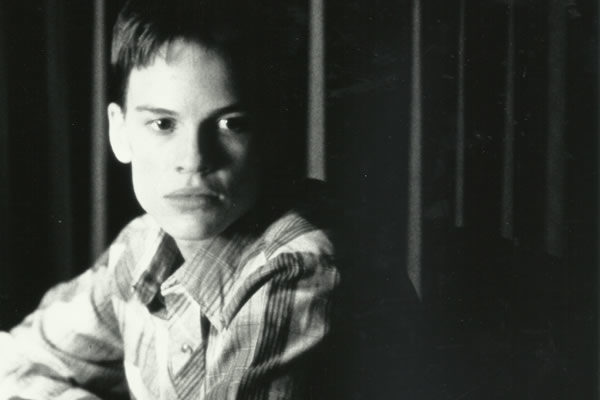
It’s been 20 years ago this month since the release of “Boys Don’t Cry,” the Fox Searchlight movie that depicted the true story of Brandon Teena, a trans man played by Hilary Swank, who adopts a male identity in Nebraska but is murdered in a hate crime.
Directed by Kimberly Peirce, whose interest was piqued by a 1994 Village Voice article about Teena, the film was made for $2 million and made $20 million at the box office. It premiered Oct. 8, 1999 at the New York Film Festival and went into wider release later in the month.
Swank won a bounty of awards for the role including prizes from the New York Film Critics Circle, the Chicago Film Critics, the Boston Society of Film Critics, the Independent Spirit Award, the Golden Globe and the Oscar. It was both widely praised in reviews at the time and holds an 88 percent fresh rating on Rotten Tomatoes.
It’s unlikely, though, that Swank would get cast in the role were it made today. With trans actresses Mj Rodriguez, Indya Moore, Dominique Jackson, Hailie Sahar and Angelica Ross having been cast on the Ryan Murphy FX drama “Pose,” and Scarlett Johansson all but forced to withdraw last year from her planned movie “Rub & Tug” (she was to play a trans character based on Dante Gill, who ran massage parlors in the ‘70s and ‘80s that were brothel fronts) after a backlash ensued, many say it’s a new day for trans actors. Of Johansson, trans actress Trace Lysette (Shea on “Transparent”) wrote on Twitter, “Not only do you play us and steal our narrative and our opportunity but you pat yourselves on the back with trophies and accolades for mimicking what we have lived.”
Cisgender backlash
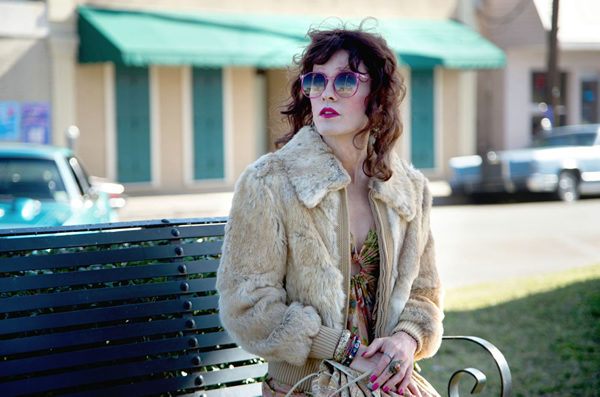
Elle Fanning drew ire the year before for being cast in “3 Generations” as Ray, a female-to-male trans teen. A groundswell had been building with actors like Matt Bomer in “Anything” (2017), Eddie Redmayne in “The Danish Girl” (2015) and Jared Leto in “Dallas Buyers Club” (2013) drawing muted but present backlash.
Conversely, on TV, trans actress Candis Cayne earned the distinction of being the first trans actress to play a recurring trans character on a primetime show when she played Carmelita on ABC’s short-lived “Dirty Sexy Money” (2007-2009). Trans actress Nicole Maines plays the first trans superhero as Dreamer/NiaNal on The CW’s “Supergirl.” In its latest report, GLAAD says there are 26 trans characters currently on TV, vs. 17 in its previous report.
Leto ended up winning a Best Supporting Actor Oscar for his role. Redmayne won the Best Actor Oscar for his and back in 2005, Felicity Huffman was nominated for playing trans in “Transamerica.” A trend was clearly at play — playing trans is Oscar catnip for cisgender actors.
That’s a problem, working trans actors today say.
“The Academy seems to see it as some heroic transformation, but is it any more a feat of acting than what, say, Daniel Day-Lewis did as Lincoln, or any number of great performances you could name,” says Samy Nour Younes, a trans male stage and screen actor in New York. “Beyond the fact that they’re playing another gender identity, the roles are usually not that good. If you watch ‘Boys Don’t Cry,’ ‘Transamerica’ or ‘Dallas Buyers Club,’ which is the worst among them, they’re not particularly well written characters period, not because they assumed a marginalized identity, but we think there’s something inherently taboo or exotic, but in a stigmatized kind of way, about it. Like, ‘Oh, you’re so brave, you deserve an Oscar,’ when it actually wasn’t that great.”
Younes says “Transparent,” the hit 2014-2019 (it just wrapped with a musical finale on Amazon Prime Video Sept. 27) show on which he guested twice in its fourth season, was a game changer just before “Pose” hit big. Although cis actor Jeffrey Tambor played Maura, a retired college professor who comes out as trans, creator Jill Soloway enacted a “transfirmative action program” for the show (cast and crew) where trans applicants were hired in preference to cis applicants. Tambor (“The Larry Sanders Show,” “Arrested Development”) left the show in late 2017 amid sexual misconduct allegations.
“Just letting trans people in the room — directors, writers, consultants — makes a huge difference,” Younes says. “That’s when we start getting layered and nuanced characters that tell stories beyond their transitions, with interesting people. We’re seeing less and less of a need for the Eddie Redmaynes of the world who say, ‘Oh, I did so much research,’ which I call bullshit on that because if you’d really done so much research, you’d have an understanding that we’re not just some costume you can slip on which just helps solidify the Academy’s thinking that that’s all it is and playing trans becomes a farce.”
The casting conundrum
Tammara Billik, a veteran Hollywood casting director known for her work on “Married … with Children” and the famous coming-out episode of “Ellen” in 1997, says things have come a long way since the “Boys Don’t Cry” era.
For one, she says, TV has come into a “golden age” that has “provided a lot more opportunities for all kinds of inclusive roles.”
“Not just with ‘Pose’ and ‘Transparent,’ but now there are a number of trans actors,” Billik, a lesbian, says. “I just read something about their being a trans actor in a series regular role on ‘The Politician’ with Ben Platt. I didn’t know anything about that. It’s happening without a big splash, it’s happening on weekly shows, so I think there is tremendous progress in terms of the trans actor community, particularly on TV.”
Film, she says, is different.
“When ‘Boys Don’t Cry’ came out, gosh, I don’t think I knew a trans actor at the time. … It certainly wouldn’t have been a time when a trans actor would have been cast. Now you would be hard pressed to cast that role with a cis actor,” Billik says. “You just wouldn’t do it, right?”
She says the Johansson episode was “a giant shift.”
“In both a good and bad way,” Billik says. “It’s good for the actors and a good way to show more diversity on television but we’ve also seen a backlash against particularly trans women of color. I’m not saying ‘Pose’ is responsible for it, but people get angry when you show them the truth. We’re all wondering why so many trans women of color are being targeted for violence. Is it because we’re seeing their images more on TV, is it because people have been emboldened by Trump? I don’t know the answer to that.”
It’s an issue GLAAD has been working on for years. Nick Adams and Alex Schmider, GLAAD’s Transgender Media Program team, work with TV networks, production companies, showrunners, script writers, casting directors and agencies as well as PR firms to help bring what it calls “fair and accurate representations for transgender people to the screen.”
They say things are improving dramatically.
“Hollywood is beginning to tell more accurate and well-rounded stories about transgender people and casting trans characters more authentically,” Schmider said in an e-mail comment to the Blade. “Not only are trans characters starting to be written with more nuance, complexity and humanity in the worlds in which they exist, but casting has also begun to evolve in positive ways.”
By their count, there’s only one cis actor still playing a trans role on TV.
The issue is a bit more complex, casting vets say, than “casting more authentically.” Alexa L. Fogel, casting director for “Pose” and a slew of HBO shows such as “Oz,” “The Wire,” and others, says it’s “a really complicated issue” that has multiple angles.
“TV is easier in that you’re creating characters, you’re creating roles, you’re creating stars,” she says. “In the case of ‘Pose,’ none of these people were known before. A lot of them hadn’t really acted before. These roles could be crafted around these people’s strengths to some degree, not so much in the character of Elektra, with her we had to find someone who could deliver what was on the page, and that was challenging for sure, but I think the other side of it is that certainly with films, there are certainly situations in which you need to sell tickets to things. Certain things might not get made without movie stars. These are complicated questions and I don’t know that anyone knows the answers to them all yet, but it’s a conversation.”
The decision to cast trans actors on “Pose” was made prior to Fogel’s involvement with the show. She says that added a layer to the casting process, but she didn’t see it as an extra burden.
“It’s part of the joy of the job,” says Fogel, who declined to state her own sexual orientation or gender identity. “It’s about rising to the challenge. I never considered that it couldn’t be done. It was just about, you know, doing the research, getting ambassadors to the community, making sure I had enough time to meet enough people. Anytime you do something that’s less visible, it’s more time consuming.”
How deep was the talent pool?
“I wouldn’t say it was a huge talent pool, but I’ve done a lot of projects where you just have to really put your head down and do extra research and this was one of them,” she says. “It was challenging but it never felt that it was going to be impossible. It just meant we had to do extra work.”
She’s not aware if the Screen Actors Guild tracks its members’ gender identity (SAG did not respond to requests for clarification on that). Fogel says membership is easy to secure once she casts a lead role.
Could ‘Pose’ be a fluke?
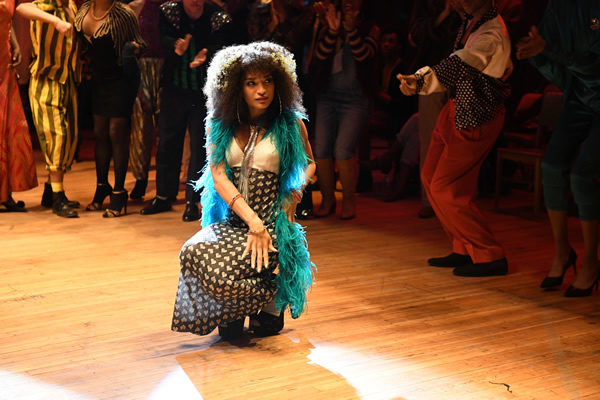
Is “Pose” a one-off or a game changer?
“I don’t have a crystal ball, but I think yeah, the ground is certainly shifting in terms of the conversation,” Fogel says. “I think it’s ultimately about the writing, about the culture and what people feel like they want to see. People want real representation and that seems to be happening across the board.”
Billik agrees.
“‘Pose’ is telling a story that’s really spectacular and a lot of people are really responding to it, so I don’t think it will be a one-off,” she says. “I think we’ll see a whole slew of trans actors cast because of it.”
Aneesh Seth, a trans actress on the Netflix show “Jessica Jones,” says there’s still “a long way to go.”
“Athough trans folks have gained some control over the types of trans narratives out there, they can still tend to be reductive and focused on our trauma,” she said in an e-mail. “Where are the stories of trans folks winning? Falling in love? Having successful marriages and careers?”
Is this the end, at least, of the big stars taking home Oscars and nominations for all the major trans movie roles? And how realistic is it — theoretically — for a trans actor to have given the caliber of performance Swank gave in “Boys Don’t Cry”?
Some say it’s a chicken-or-the-egg argument. If trans actors had been given time to build up their resumes on equal footing with a Swank or a Jared Leto, who knows what they might have achieved? That’s not to say they had easy rides — Swank and her mother, for a time, lived out of a car upon moving to Los Angeles as Swank pursued her dream. But inarguably, upon starting her acting career, she got cast in varied roles far faster and more regularly than any trans actor would have fared, especially in the ‘90s.
Fogel, especially, says it’s hard to account realistically for “what ifs.”
“You can’t really know the answer to that without doing the work,” she says. “I couldn’t have answered any of these questions about ‘Pose’ before I’d done it. The process is so important when it comes to casting. You really have to do the work to find the people, it’s all about the process.”
Looking ahead
The path ahead, many agree, is bright.
“I actually think Time magazine jumped the gun a little bit when they put Laverne Cox on the cover for ‘Orange is the New Black’ and said it was ‘The Transgender Tipping Point,’” Younes says. “Not to take anything away from her, but I think the tipping point is actually now because it’s not just one, it’s multiple roles. There’s a brand new pool of talent and we’re more open to the fact that it could come from anywhere.”
Several folks interviewed for this piece mentioned bit parts they’d seen trans actors cast in of late. Billik just saw “Moulin Rouge” on Broadway and said one of four ladies in the opening number was trans. Younes knows a trans colleague in the ensemble in “Tina: the Tina Turner Musical,” which opens at the Lunt-Fontanne Theatre on Broadway next month (previews are in October). He also cites two trans actors with brief speaking parts in this summer’s “Spider Man: Far From Home.”
GLAAD reps helped cast Zoey Luna, a trans Latina actress, in “The Craft” reboot from Sony as Lourdes, one of the lead girls in the coven who happens to be trans. In 2018, not one of the 110 major studio films released included a trans character, according to GLAAD.
“So this casting and character are game changers in the film landscape,” Schmider says.
Non-binary actor Asia Kate Dillon on Showtimes “Billions,” is another positive step, many agree. And Daniela Vega made history in “Fantastic Woman,” a 2017 Chilean drama that won an Oscar. Vega was the first trans presenter in the history of the Academy Awards when she presented in 2018.
“This isn’t a trend, this isn’t just the topic du jour,” Younes says. “For decades, all we could get were playing the dead hooker on ‘Law & Order: SVU.’ … I hope it’s a continuing trend for trans people making inroads in entertainment.”
SIDEBAR: ‘Boys Don’t Cry’: problematic in retrospect?
Although it was seen as fairly groundbreaking in its day, the 1999 film “Boys Don’t Cry” hasn’t aged particularly well, some argue.
Donna Minkowitz, the writer of the original Village Voice story that inspired the movie, apologized last year in a piece she wrote (also for the Voice) called “How I broke, and botched, the Brandon Teena Story.”
“For years, I have wanted to apologize for what I now understand, with some shame, was the article’s implicit anti-trans framing,” Minkowitz wrote. “Without spelling it out, the article cast Brandon as a lesbian who hated ‘her’ body because of prior experiences of childhood sexual abuse and rape. … At the time, I was extremely ignorant about trans people. Like many other cis queer people at the time, I didn’t know that there were gay trans men, trans lesbians, bisexual trans folks, that being trans had nothing to do with whether you were straight or gay, and that trans activism was not, as some of us feared, an effort to stave off queerness and lead ‘easier,’ more conventional heterosexual lives.”
The trope of the butch lesbian who takes things “just a little too far” and comes out as trans, is a recurring one, trans actor Samy Nour Younes says. He, too, found the film adaptation “problematic.”
“There was a similar storyline on ‘The L Word,’ when Max Sweeney starts taking hormones and becomes this raging monster, a really awful storyline. Seeing some of those things and ‘Boys Don’t Cry’ were the first representations I saw of a trans masculine storyline and stopped me from coming out sooner.”
a&e features
Your guide to the many Pride celebrations in D.C. region
Scores of events scheduled across DMV amid WorldPride excitement
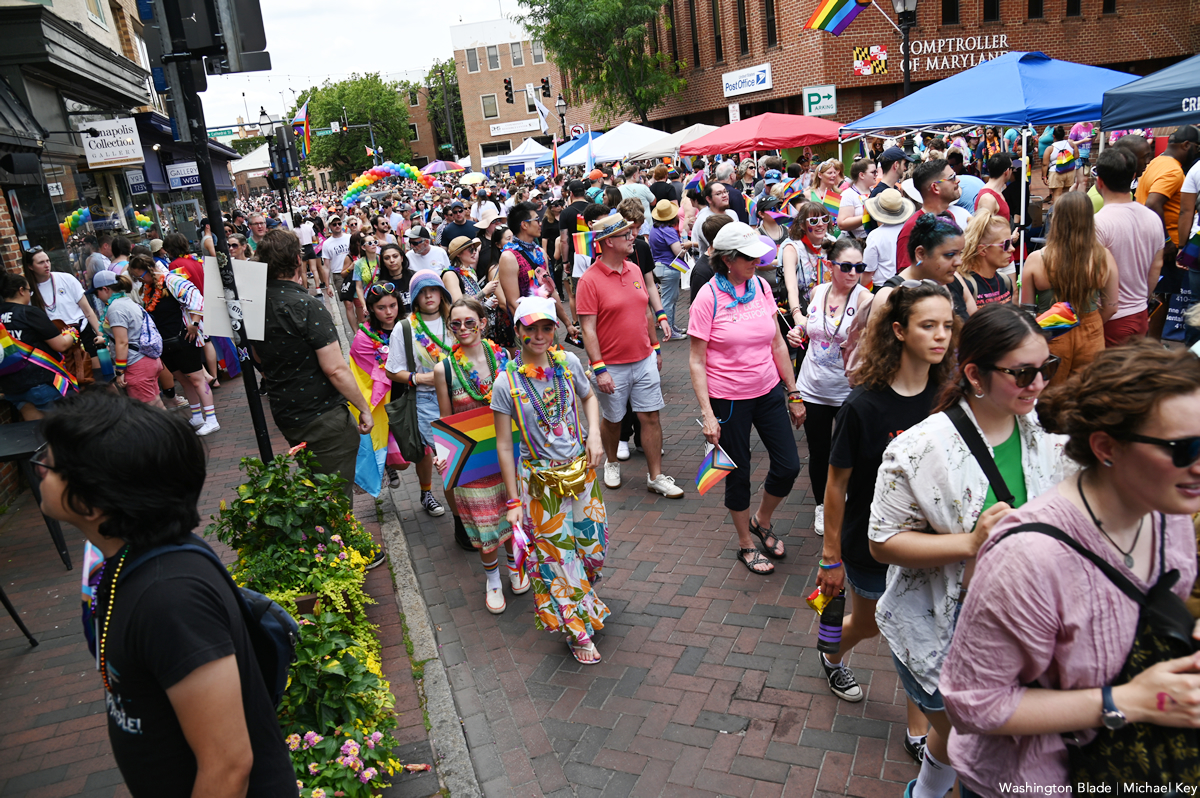
June is just around the corner, but Pride events have already begun in the region. There are many events scheduled in D.C. for WorldPride 2025, as well as for D.C. Black Pride, Trans Pride, Silver Pride, Latinx Pride, API Pride and Youth Pride. Cities and towns in the region also offer their own LGBTQ Pride festivals and parades.
D.C. API Pride has events scheduled from May 17-June 8 with meetings, shows, concerts, workshops and socials. Highlights include the API Pride Welcome Reception on Wednesday, June 4 at the National Union Building (918 F Street, N.W.); a screening of Saving Face with Director Alice Wu on Sunday June 1 from 2-4 p.m. at the Smithsonian Asian Art Museum (1050 Independence Avenue, S.W.); the Desi & South Asian Drag Show on Thursday, June 5 from 10 p.m. to 2 a.m. at Sinners & Saints (639 Florida Avenue, N.W.); and the QTAPI Nightlife Extravaganza on Friday, June 6 from 10 p.m. to 3 a.m. at Koi Lounge (1413 K Street, N.W.) Visit qtapidc.org/apipride for more information and to register for events.
D.C. Silver Pride is scheduled for Wednesday, May 21 from 4-7 p.m. at the Eaton Hotel (1201 K Street, N.W.). The resource fair and tea dance is hosted by Rayceen Pendarvis.
D.C. Latinx Pride has events scheduled from May 16-June 19. Highlights include a kickoff reception on Thursday, May 22 from 8-10 p.m. at Shakers DC (2014 9th Street, N.W.); La Fe, a celebration of faith and resilience, at the Metropolitan Community Church of Washington (474 Ridge Street, N.W.) on Sunday, May 25 from 10:30 a.m. until 1:30 p.m.; La Fiesta: the Official Latinx Pride Party at Bunker (2001 14th Street, N.W.) on Thursday, May 29 at from 9 p.m. until 3 a.m.; as well as parties, a history walking tour, a film festival, panel discussions and more. Tickets are available for the Official Latinx Pride Party at latinxhistoryproject.org and run from $15 to $76.
Trans Pride Washington, D.C. is scheduled for May 17 beginning with registration at 9:30 a.m., a resource fair from 10 a.m.-4 p.m., panel discussions and workshops throughout the day, the Engendered Spirit Awards at 4 and a keynote speech by Schuyler Bailar with an afterparty scheduled for 6-9:30 p.m. RSVP at transpridewashingtondc.org. Location is shared after RSVP.
D.C. Youth Pride has events scheduled from May 30-June 7 in various locations throughout the city. Registration is free but required. Youth Pride Day is scheduled for May 31 from 10 a.m. to 2 p.m. at Woolly Mammoth Theater Company (641 D Street, N.W.). The event is for LGBTQ+ youth ages 6-18 years old and their parents/caregivers/family (those over 18 must be accompanying an attendee 18 years of age or younger). Register on Eventbrite. Other events include the “Pride Rising” event on Friday, May 30 for LGBTQ+ young adults, a Teen Pride Night, a book launch and a “Proud to Teach” mixer for LGBTQ+ educations at Crush Dance Bar (2007 14th Street, N.W.) on Thursday, June 5 from 6-8:30 p.m.
D.C. Black Pride
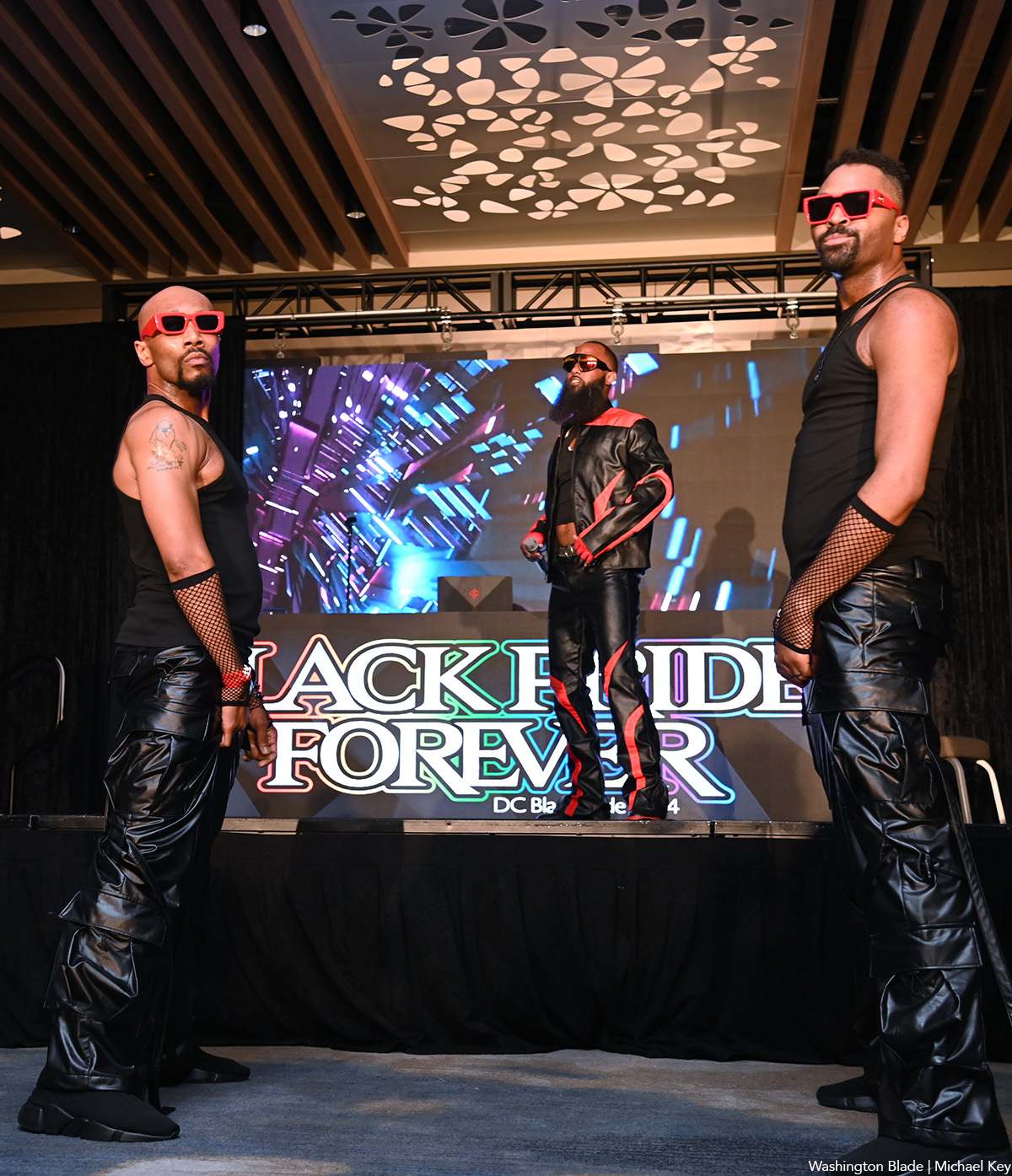
The 34th annual D.C. Black Pride has events scheduled from Wednesday, May 21 through Monday, May 26 at the Capital Hilton (1101 16th Street, N.W.) and other venues throughout the city.
Thurst Lounge (2204 14th Street, N.W.) is holding a Thurstnik Reloaded extended hours nightlife event from May 21-26. The event is free; no tickets or wristbands are required.
Xavier Entertainment presents 5 days with 8 events for Black Pride with Supreme Fantasy 2025 from May 22-26. Passes are available at xavierpartydc.com. Events include the DC Black World Pride Kickoff party at Nellie’s Sports Bar (900 U Street, N.W.) on Thursday, May 22; the 3000 Men Block party at Karma (2221 Adams Place, N.E.) on Friday, May 23; Official DC Black Pride After Hours parties at Power Nightclub (2335 Bladensburg Road, N.E.) are scheduled for Saturday, May 24, Sunday, May 25 and Monday, May 26 from 4-8 a.m.; the Cook Out Party is scheduled for Saturday, May 24 from 5-9 p.m. at Aqua Nightclub (1818 New York Avenue, N.E.); the 5000 Men Meatloaf Saturday Rooftop Party featuring headliner Yung Miami at Public Nightclub (1214 18th Street, N.W.) on Saturday, May 24 from 10 p.m. to 4 a.m.; the DC Black World Pride Main Event at Nellie’s Sports Bar (900 U Street, N.W.) is scheduled for Sunday, May 25 starting at 4 p.m.; the Meatloaf After Dark party at Power Nightclub (2335 Bladensburg Road, N.E.) is scheduled for Monday, May 26 from 10 p.m. until 2 a.m.
The Welcome to D.C. Happy Hour is scheduled for Thursday, May 22 from 5-10 p.m. at Metrobar (640 Rhode Island Avenue, N.E.).
The Welcome to D.C. Happy Hour is scheduled for Thursday, May 22 from 5-10 p.m. at Decades Rooftop (1219 Connecticut Avenue, N.W.). Purchase tickets at blisspride.com.
The 9th annual D.C. Black Pride Unity Free Ball is scheduled for Thursday, May 22 from 9 p.m. until 1 a.m. at the Capital Hilton Hotel (1001 16th Street, N.W.). RSVP at Eventbrite for the free event.
Daryl Wilson Promotions presents The Pregame Act 1 party scheduled for Thursday, May 22 from 10 p.m. until 2 a.m. at The Ugly Mug (723 8th Street, S.E.).
The Welcome Reception is scheduled for Friday, May 23 at 3 p.m. until 9 a.m. on Saturday at the Capital Hilton Hotel (1001 16th Street, N.W.).
The 34th annual D.C. Black Pride Opening Reception is scheduled for Friday, May 23 from 5-10 p.m. at the Capital Hilton Hotel (1001 16th Street, N.W.). Special guests include Kerri Colby, TS Madison and Monroe Alise.
The Bliss Pastel Party, a women’s event, is scheduled for Friday, May 23 from 10 p.m. until 3 a.m. at Strand (1400 Eye Street, N.W.). $20 advance tickets are available at Blisspride.com.
The Capital House Music Festival salutes Sam the Man Burns at a free music festival featuring artists and DJs on May 24 from 10 a.m. until 9:30 p.m. at Alethia Tanner Park (227 Harry Thomas Way, N.E.).
The “For the Culture” Brunch Cruise is scheduled for Saturday, May 24 aboard The Spirit of Washington. Boarding time is 11:15 a.m. at the dock at 580 Water Street, S.W. The boat returns to the dock at 3 p.m.
The Writers Forum, a panel of Black, LGBTQ+ writers, is scheduled for Saturday, May 24 from 1-3 p.m. at the Capital Hilton Hotel (1001 16th Street, N.W.).
Daryl Wilson Promotions presents the “Infamous” Saturday Day Party on May 24 from 5-11 p.m. at The Park (1201 Half Street, S.E.).
The Mary Bowman Poetry Slam Open Mic is scheduled for Saturday, May 24 from 6-8 p.m. at the Capital Hilton Hotel (1001 16th Street, N.W.). Twelve of performance poets from around the country compete for over $1,500 in prizes in a night of poetry hosted by Kenneth Something.
The Pure Bliss Party, a women’s event, is scheduled for Saturday, May 24 from 10 p.m. until 3 a.m. at Strand (1400 Eye Street, N.W.). Tickets are $25 in advance and available at Blisspride.com.
The Capitol Ballroom Council presents Brunch & Babes: DC Black Pride WorldPride Edition at Hook Hall (3400 Georgia Avenue, N.W.) on Sunday, May 25 from noon until 4 p.m. The drag event, hosted by Sophia McIntosh, features a brunch buffet and giveaways. Tickets are $20-$80.
The Clubhouse 50th anniversary “Children’s Hour Party” with special guest Rochelle Fleming is scheduled for Sunday, May 25 from 3-9 p.m. at Bravo Bravo (1001 Connecticut Ave., N.W.).
Daryl Wilson Promotions presents The Wet Dreams Mega Day Party scheduled for Sunday, May 25 from 5-11 p.m. at The Bullpen (1201 Half Street, N.E.).
D.C. Black Pride 2025 Closeout – The Finale is scheduled for Sunday, May 25 from 6-10 p.m. at Twelve After Twelve (1212 18h Street, N.W.). $15 advance tickets are available at Blisspride.com.
Daryl Wilson Events is hosting the Sunday Night Super Party on Sunday, May 25 from 10 p.m. until 4 a.m. on Monday at The Park (920 14th Street, N.W.).
Pride in the Park is scheduled for Monday, May 26 from 12-7 p.m. at Fort Dupont Park (Minnesota Avenue, S.E.).
The World Pride Black Queer Film Festival is scheduled for May 27-29 from 6-9 p.m. at Howard University’s Blackburn Digital Auditorium (2397 6th Street, N.W.). The event is free, but RSVP and see descriptions of films and showtimes on Eventbrite.
D.C. WorldPride 2025
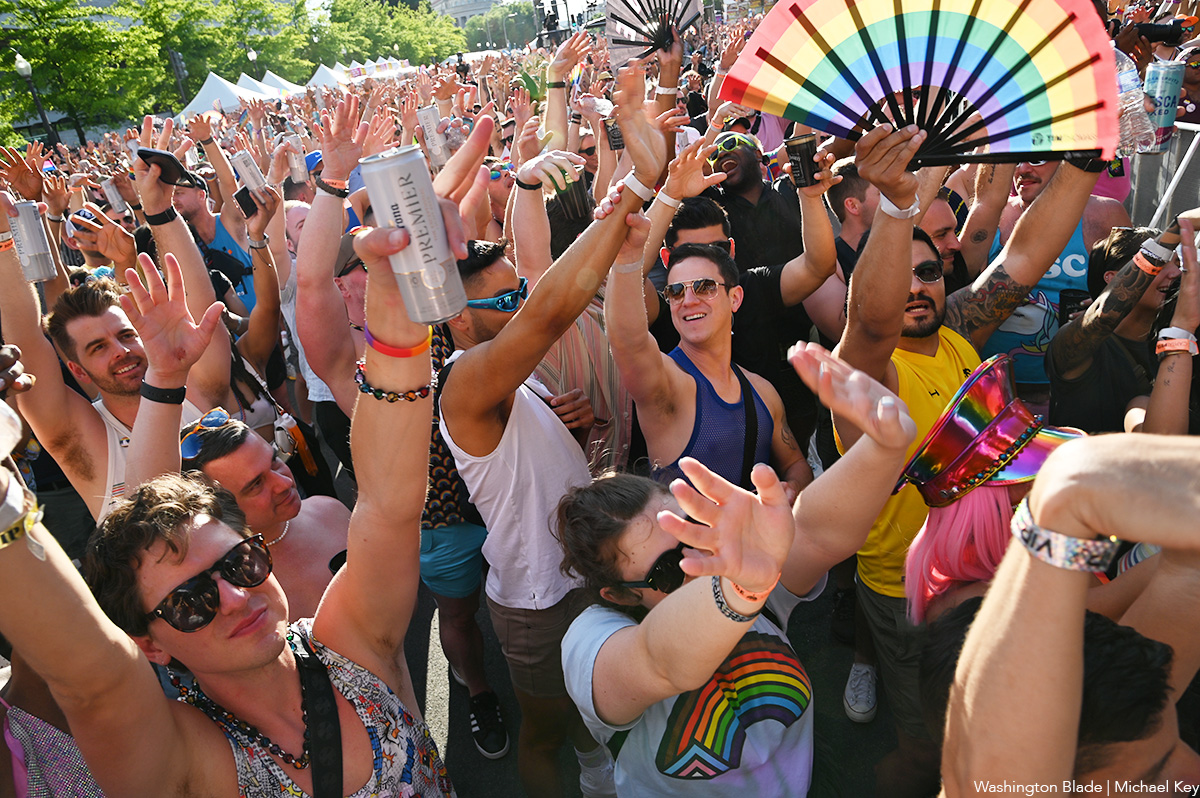
The international event WorldPride 2025 is to be held in Washington, D.C. from May 18-June 8. Events include a Choral Festival from May 23-June 8; a WorldPride Film Festival from May 27-29; the Capital Cup Sports Festival from May 30-June 4; a Human Rights Conference on June 4-6, as well as marches, concerts, parties, a street festival and more. Visit worldpridedc.org for more information on affiliated events.
The Gay Men’s Chorus of Washington is presenting the International Choral Festival for WorldPride 2025 with daily hour-long pop-up performances from singers from around the world on Friday, May 23 through Sunday, June 8 in venues throughout the city. The festival is free and open to the public, however, premium passes with reserved seating is available at GMCW.org.
The WorldPride Film Festival is scheduled for Tuesday, May 27 through Thursday, May 29 and includes LGBTQ-themed films from across the globe. Screenings are to be held at Alamo Drafthouse Cinema – Cojeaux Cinemas (630 Rhode Island Avenue, N.W. and 1660 Crystal Drive, Arlington, Va.) and Atlas Performing Arts Center – Sprenger Theater (1333 H Street, N.E.). Movie descriptions and showtimes are listed at worldpridedc.org.
Team D.C. is hosting the Capital Cup Sports Festival on Friday, May 30 through Wednesday, June 4 in multiple venues. Athletes from around the world compete in basketball, bocce, cornhole, climbing, swimming, darts, dodgeball, flag football, kickball, golf, pickleball, regatta, roller derby, rugby, soccer, tennis, volleyball and wrestling. The D.C. Front Runners annual Pride Run 5K at Congressional Cemetery on June 1 is included. Find a tentative schedule and registration information at worldpridedc.org.
The Welcome Ceremony + Concert is scheduled for Saturday, May 31 at National’s Park (1500 South Capitol Street, S.E.). Shakira is performing in her Las Mujeres Ya No Lloran World Tour. Tickets run from $108 to $730 and can be purchased through Ticketmaster.
The WorldPride Human Rights Conference is scheduled for Wednesday, June 4 through Friday June 6 at the JW Marriott (1331 Pennsylvania Avenue, N.W.). Featured speakers include the Right Reverend Mariann Edgar Budde, Dr. Lady Phyll and Paula Gerber. Early bird registration is available through capitalpride.org for $350, with virtual registration available for $200.
The National Trans Visibility March is holding a Policy and Safety Summit at the Hyatt Regency Crystal City at Reagan National Airport (2799 Richmond Highway, Arlington, Va.) on Thursday, June 5 through Friday, June 6. Find more information on panels and topics at ntvmarch.org.
The Capital Pride Honors are scheduled for Thursday, June 5 from 7-11 p.m. at the National Building Museum (401 F Street, N.W.). The red carpet gala includes live music, food and a formal awards ceremony for trailblazers in the LGBTQ+ community. Tickets are $105.25 and are available through capitalpride.org.
The Pride Celebration Concert with the International Pride Orchestra is scheduled for Thursday, June 5 at 7:30 at Strathmore Music Center (5301 Tuckerman Lane, North Bethesda, Md.). The International Pride Orchestra joins the Gay Men’s Chorus of Washington for an evening of music. Tickets run from $35-$100 and can be purchased through strathmore.org.
The World Pride Music Festival: Global Dance Party is scheduled for Friday, June 6 through Saturday, June 7 at RFK Festival Grounds (2500 Independence Avenue, S.E.). The two day festival spans three stages. Attendees must be 18 years of age or older to participate. Performers on Friday include Jennifer Lopez, Gallants, Marina, Paris Hilton, Rita Ora, Tinashe, Betty Who, LP Giobbi, Patrick Mason and Trisha Paytas among others, with a closing set by Zedd. Saturday performers include Troye Sivan, Grimes, Kim Petras, Purple Disco Machine, Ray, Sofi Tukker, Anabel Englund, Coco & Breezy, Crush Club, Aluna, Sasha Colby and a DJ set by RuPaul.
The WorldPride 17th Street Block Party is scheduled for Friday, June 6 from 5-10 p.m. and Saturday, June 7 from noon until 10 p.m. along 17th Street, N.W. in the Dupont Circle neighborhood. There will be a beverage garden and LGBTQ+ entertainment.
The Washington Blade is hosting the sixth annual Pride on the Pier Boat Parade & Fireworks Show at The Wharf (101 District Square, S.W.) on Friday, June 6 from 3-10 p.m. and Saturday, June 7 from noon until 10 p.m. The event is free, though VIP tickets are available for purchase on Eventbrite for $30. The boat parade is schedule for 7 p.m. on June 6, and the fireworks show is scheduled for 9 p.m. on June 7. More information is available at prideonthepierdc.com.
The Full Bloom: Friday Main Event is scheduled for Friday, June 6 at 9 p.m. at 1235 W Street, N.E. Tickets are $100 and available at capitalpride.org.
LUSH: The DC Lesbian Nightclub Experience is scheduled for June 6 at 10 p.m. at 618 DC (618 H Street, N.W.). Advance tickets are $15 at ra.co. The event is 21+ and features an “all-dyke DJ lineup” with Lady Lavender, Flotussin and Jacq Jill.
The WorldPride Parade is scheduled for Saturday, June 7 with the step off at 2 p.m. at 14th Street and T Street, N.W. The parade is slated to move down 14th street to Freedom Plaza and then Pennsylvania Avenue.
The WorldPride Street Festival is scheduled for Saturday, June 7 and Sunday June 8 for noon until 10 p.m. along Pennsylvania Avenue, N.W. between 9th and 3rd Streets. There will be food courts, beverage gardens, a Camp Pride Family Area / kids’ zone, community vendors, activities, entertainment and more.
The Post-Parade + Closing Concerts is scheduled for Saturday, June 7 through Sunday, June 8 at the Street Festival and Concert Grounds at 3rd Street and Pennsylvania Avenue, N.W. The event is free to the public, though Tier 2 VIP tickets are available (and quickly selling out) at capitalpride.org for $335.01 for the Saturday concert or $575.20 for Saturday and Sunday. Cynthia Erivo, David Archuleta, CeCe Peniston and Kristine W take the stage on Saturday for the post-parade. Doechii, Khalid, Brooke Eden, 2AM Ricky, Parker Matthews and MkX are scheduled to perform in the Sunday Closing Concert.
The Fabric of Freedom Main Saturday Event is scheduled for June 7 at 10 p.m. at 1235 W Street, N.E. KINETIC Presents and the Capital Pride Alliance host the party featuring three stages, over 100,000 square feet of dance floor, and a performance by Pabllo Vittar. Tickets are available for purchase at capitalpride.org and run from $120.92 to $188.80.
Unwraveled: The Official Women’s Party for WorldPride 2025 is scheduled for Saturday, June 7 from 10 p.m. to 4 a.m. at The Park at 14th (920 14th Street, N.W.). Tickets run from $63.48 to $105.25 and are available for purchase at capitalpride.org.
The International Rally + March on Washington for Freedom is scheduled for Sunday, June 8 with the rally beginning at 9:30 a.m. and the march kicking off from the Lincoln Memorial (2 Lincoln Memorial Circle, N.W.) at noon. The march will end near the U.S. Capitol Building for the WorldPride DC Street Festival and Closing Concert.
Visit worldpridedc.org/events to see a full list of partner and affiliate events for WorldPride 2025 in Washington, D.C.
Regional Prides
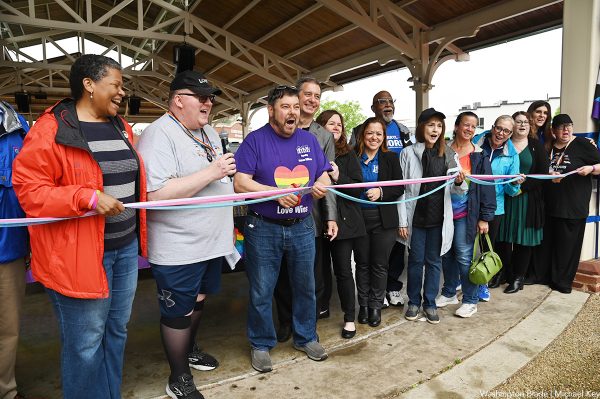
The fourth annual Equality Prince William Pride is to be held on Saturday, May 17 at the Harris Pavilion (9201 Center Street, Manassas, Va.) from noon until 4 p.m. The family-friendly event is held in the historic center of Old Town Manassas.
The second annual Herndon Pride is being held at Arts Herndon (750 Center Street, Herndon, Va.) on Saturday, May 24 from noon until 5 p.m.
Annapolis Pride, one of the larger Pride celebrations in the region, includes both a parade and festival on Saturday, May 31. The parade is scheduled to begin at 11 a.m. at the intersection of Calvert and Bladen Streets and end at Amos Garrett Boulevard off of West Street. The festival is to be held at Maryland Hall (801 Chase Street, Annapolis, Md.) from noon until 5 p.m.
The 2025 Arlington Pride Festival is scheduled for Saturday, May 31 from 9 a.m. to 6 p.m. at the Hyatt Regency Crystal City (2799 Richmond Highway, Arlington, Va.). The indoor event is free. A number of other ticketed events ($30-$250) are scheduled for Arlington Pride as well, including a pageant hosted by Shi-Queeta Lee, a drag brunch, speed dating and an afterparty.
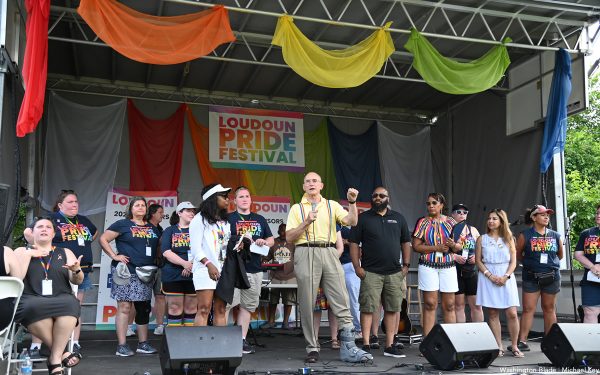
The fourth annual Loudoun Pride Festival is scheduled for Saturday, May 31 from noon until 6 p.m. at Ida Lee Park (60 Ida Lee Drive N.W., Leesburg, Va.). The ticketed event ($5) includes musical performances, a magic show, face painting, bounce houses, food vendors, an alcohol pavilion and the return of “Dragstravaganza.”
Page County / Luray Pride is set for Saturday, May 31 from noon until 5 p.m. at River’s Bend Ranch (397 Riverbend Rd., Stanley, Va.). The family-friendly event is free, but horseback riding is available for those who sign up in advance for $60 + tip to trail guide.
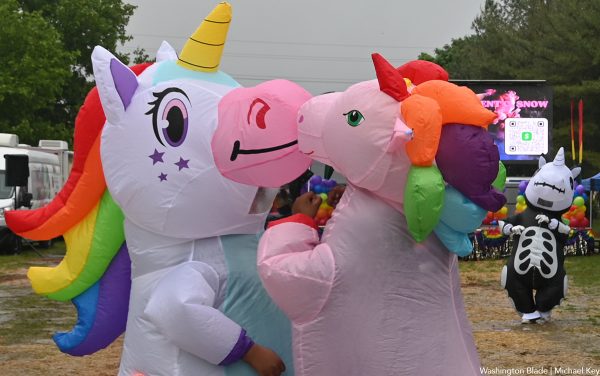
The Charles County Department of Health is holding the third annual PrEP for Pride at 4545 Crain Highway in White Plains, Md. from noon until 5 p.m. on Saturday, May 31. The free festival includes a spirited Pride Walk, entertainment and vendors.
Reston Pride is scheduled for Saturday, May 31 from 6-9 p.m. and Sunday, June 1 from 11 a.m.-6 p.m. at Lake Anne Plaza (1609 Washington Plaza N., Reston, Va.). The free events planned for the weekend include the Rising Voices! Community Concert on Saturday and the Pride Festival on Sunday.
The third annual Culpeper Pride Festival is scheduled for Sunday, June 1 from noon until 5 p.m. at the Mountain Run Winery (10753 Mountain Run Lake Road, Culpeper, Va.). The free event includes music, vendors, a 2 p.m. runway contest. An after hours drag show is scheduled for 6-8 p.m., with tickets available for $10.
The City of Rockville Human Rights Commission is hosting the ninth annual Rockville Pride Festival on Sunday, June 1 from 2-5 p.m. at Rockville Town Square (131 Gibbs Street, Rockville, Md.).
The fourth annual Portsmouth Pride Fest is scheduled for Sunday, June 1 from 11 a.m. until 5 p.m. at Portsmouth Festival Park (16 Crawford Circle, Portsmouth, Va.). The family-friendly free event includes entertainment, vendors, community information and a dog park.
Fairfax Pride is scheduled for Saturday, June 7 from 9:30-11:30 a.m. at the Stacy C. Sherwood Center (3740 Blenheim Boulevard, Fairfax, Va.). The Fairfax Pride Launch Event hosted by Fairfax City and George Mason University is set to include children’s activities, crafts, and more.
The 4th annual Mosaic Pride is coming to the Mosaic District (District Avenue, Fairfax, Va.) with drag shows, live music and more on Saturday, June 14 from 3-9 p.m. The day’s events include a 3 p.m. parade, drag story time with Tara Hoot and an aerialist performance.
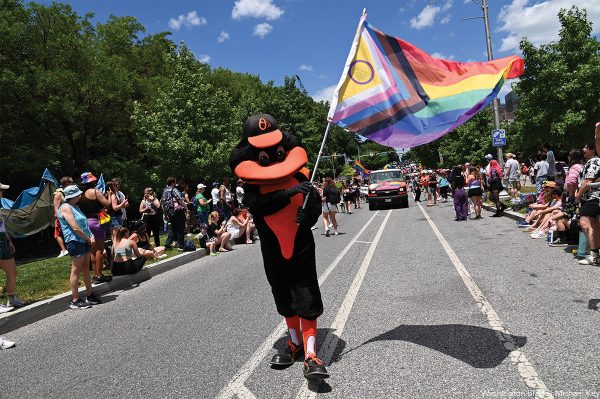
The 50th annual Baltimore Pride is to be held June 8-15. The full list of scheduled events has not yet been released, but generally includes the Baltimore Pride Parade and the Baltimore Pride Festival. Check back with the Washington Blade for more specific event times as they become available.
The fourth annual Delmarva Pride Festival is scheduled for Saturday, June 14 from 11 a.m. to 4 p.m. at S. Harrison and E. Dover Streets in Easton, Md. The free event includes vendors and entertainment. Other Delmarva Pride events scheduled over the weekend include “A Night in New Orleans” concert and dance on Thursday, June 12 at 7 p.m. at the Garfield Center for the Arts (210 High Street, Chestertown, Md.), as well as a drag show and art event on Friday, a dance (18+) on Saturday and a Pride Brunch on Sunday.
Hampton Roads Pride Weekend is scheduled for June 20-22. Weekend events include a unique boat parade, a Pridefest, a block party and more.
The fifth annual Catonsville Pride is scheduled for Saturday, June 21 from 2-5 p.m. at Catonsville Presbyterian Church (1400 Frederick Road, Catonsville, Md.). The ticketed event ($4-$5) is a charity fundraiser with all net proceeds slated to go to the Journeys Cottage at The Children’s Home (a safe space for trans youth).
The 13th annual Hagerstown Pride is scheduled for Saturday, June 21 from noon until 6 p.m. at Doubs Woods Park (1307 Maryland Avenue, Hagerstown, Md.).
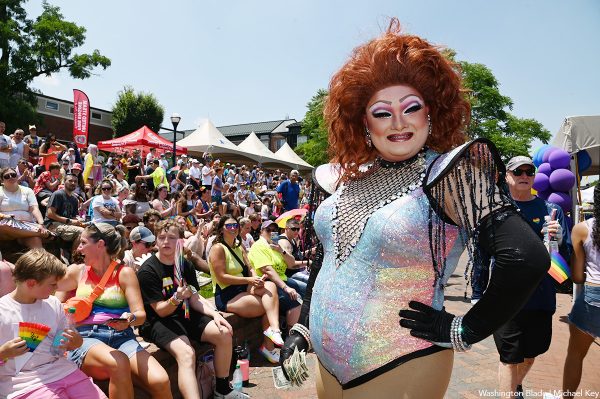
The 12th annual Frederick Pride Festival is scheduled for Saturday, June 28 from 11 a.m. to 6 p.m. at Carroll Creek Linear Park (50 Carroll Creek Way, Frederick, Md.). The free event includes a full food truck court, a beverage garden, hundreds of vendors, a car show, musical guests, drag performances, a children’s area and more.
The eighth annual Alexandria Pride Fair is scheduled for Saturday, June 28 from 3-6 p.m. at Alexandria City Hall and Market Square (301 King Street, Alexandria, Va.). The free event includes exhibitors and vendors, a drag story hour, food trucks, live music, health services a mobile art lab, dancing are more.
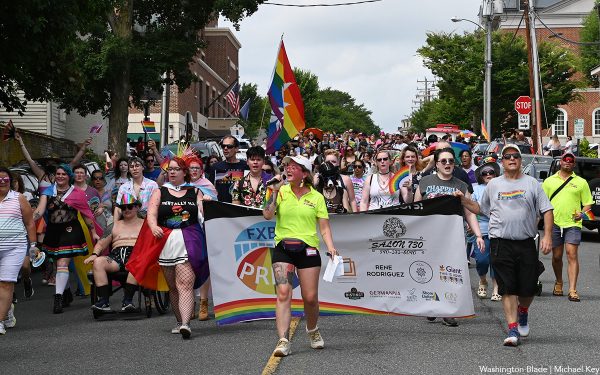
FXBG PRIDE (Fredericksburg, Va.) is scheduled for Saturday, June 28 with a march set to begin with speeches at 10 a.m. at Riverfront Park (701 Sophia Street, Fredericksburg, Va.) and move through downtown Fredericksburg. Following the march, the FXBG Pride Festival is scheduled from 11 a.m.-4 p.m. at Riverfront Park. An afterparty at Market Square (214 William Street, Fredericksburg, Va.) is scheduled for 6-11 p.m., with 18+ after 9 p.m. All events are free.
The 2025 Salisbury Pride Parade and Festival is scheduled for Saturday, June 28. The parade is planned to begin at 3 p.m. and move along Main Street in downtown Salisbury, Md. The festival is to run from 2-6:30 p.m.
The Montgomery County Pride in the Plaza is scheduled for Sunday, June 29 from noon until 8 p.m. at Veterans Plaza (1 Veterans Place, Silver Spring, Md.).
Cumberland Pride is scheduled for Sunday, June 29 from noon until 4 p.m. at Canal Place (13 Canal Street, Cumberland, Md.). The free event includes entertainment, vendors and more.
Some cities have opted for Pride celebrations later in the year. Pride festivals in Front Royal, Va. and Westminster, Md. are slated for July 26. C’ville Pride Festival (Charlottesville, Va.), Shenandoah Valley Pride (Harrisonburg, Va.) and Virginia Pridefest (Richmond, Va.) are scheduled for September. Staunton Pride (Staunton, Va.), Southwest Virginia Pride (Salem, Va.), Winchester Pride (Winchester, Va.) and HoCo Pride (Columbia, Md.) are scheduled for October.
a&e features
Gideon Glick steals the show in Amazon Prime’s ‘Étoile’
Talented actor delivers brilliant turn as quirky ballet choreographer
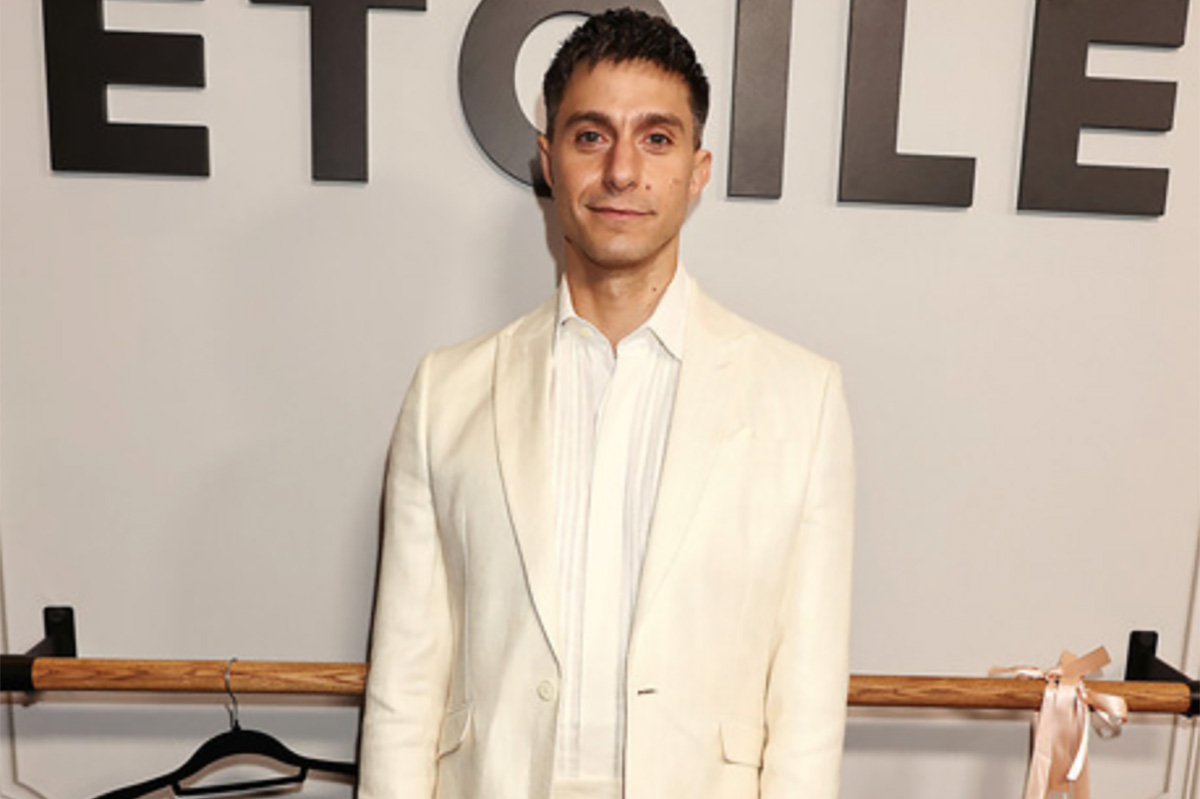
If you haven’t seen the scene stealing Gideon Glick in Amazon Prime’s “Étoile,” run do not walk to your preferred streaming platform.
The talented actor — known for his work on the Broadway show, “Spring Awakening” and movies like, “Maestro”— is fantastic as Tobias, the quirky ballet choreographer.
“Tobias is a brilliant, complicated man who lives in his own world and sees the world very clearly in his head, but I don’t think other people see it as clearly as he does,” Glick told the Blade. “I don’t know if he’s as good as communicating within his head to others … he doesn’t read people very well, and I think he’s quite blunt, and he has a very hard time if something doesn’t align with what he sees.”
Glick is also one of the writers on the series.
After working with him on their previous hit show, “The Marvelous Mrs. Maisel,” co-creators/executive producers Amy Sherman-Palladino and Daniel Palladino hired Glick as a scribe, after he expressed a strong interest in writing.
“The funny thing about Gideon was we started to create this character, this weird, semi on the spectrum, sort of strange choreographer, and we would find ourselves talking about him and then just looking at Gideon,” said Amy Sherman-Palladino at a recent press event.
“And after a while, Gideon’s like ‘why are you looking at me like every five seconds!?’ And we realized we were creating this character, and it was Gideon! In the writer’s room, about halfway through it, we said to him, ‘is it something you might wanna do?’”
Glick had that sense this was going to happen.
“We have a similar sense of humor. And we just got along really well….We were about a month into the writers’ room, and every time they talked about the character, they kept pointing to me,” he noted.
“But I didn’t know it was me. And everybody kept looking around and thought, ‘How strange is this?’ But then when they offered it to me, you know, it was a beautiful synthesis. So we kind of came up with it together, which I feel really, really lucky about.”
Added Daniel Palladino: “Gideon has his own odd, peculiar way, and it’s unmatched with anybody else.”
Glick is thrilled and deeply touched by his relationship with the Palladinos. “It’s been a very remarkable thing for me. I think when you have reverence for people, and when they respect you back and believe in you, you start to believe in yourself. And so, that started to happen to me when I started working with them, and it helped me cultivate my own career and expand on it.”
To have that level of confidence means everything to Glick.
“I think especially being in a gay community, finding people that believe in you and bolster you — you don’t let them go. Ever, ever, ever.”
As an actor who has a disability in his own life, Glick resonates with Tobias’s uniqueness.
“I was born with one ear. My right ear is completely fake. It’s made out of my rib. And hearing impaired on my left side too … I’ve had to embrace the fact that I’m different from a very, very, very early age. I also came out when I was 12. So at that point, it was kind of on the vanguard. I mean people come out all the time now. But back then, that was unique.”
He continued: “I think I’ve learned very early on that what makes you unique is your special power. And I think with Tobias, he thinks very differently than everybody else. And he’s very strident and kind of blunt about it. But he’s a brilliant man. And when it actually gets actualized, you can see the tangible beauty that he’s creating.”
Having come from a musical theater background, Glick was fascinated by the plethora of dance scenes being filmed.
“I grew up doing plays and musicals, and I got to do ‘Maestro’ and learn a little bit about classical music because of that. But this felt like the final great piece of art that I didn’t know about, and I came away knowing a lot. Especially because of the writing component.”
If you have binged all the episodes, you know that Tobias’s relationship with French ballet dancer Gabin (Ivan du Pontavice) slowly deepens into a tender, romantic connection.
“Ivan is an extraordinary actor. He’s very alive. He’s very thoughtful. I think of us as an odd couple. We’re very different characters. Gabin is a very self interested, braggadocio type. Tobias is an introvert, lives in his own world, very blunt. Two people that don’t necessarily consider the other and are not necessarily accountable to other people. And within the relationship, they learn about that, and they learn about empathy, and it’s a really beautiful, beautiful relationship, and the way that it blossoms, and then both characters blossom. It’s been a thrill to be able to perform.”
When Glick is not working, he is hard at work on his new nonprofit, the Blue Roses project.
“It’s a queer play development lab that is based in New Orleans. I co-founded it with one of my dearest friends, James McBride. Our mission is to find unproduced queer playwrights, match them with established directors, and integrate artists from outside of New Orleans with artists inside of New Orleans and tell queer stories in the South. So that’s where I’ve been directing my energy toward and we’re actually just about to launch.”
Especially with this administration, queer people are not being supported in the arts, Glick acknowledged.
“We are hoping to fill that gap in some way and offer help. I think also within the theater community, new play development, people don’t have money anymore, so we would like to create a space right now.”
a&e features
Peppermint thrives in the spotlight
In exclusive interview, she talks Netflix show — and the need to resist Trump’s attacks

As an entertainer, there’s not much that Peppermint hasn’t done. She’s a singer, actor, songwriter, reality TV personality, drag queen, podcaster and the list goes on. Most importantly, as an activist she has been an invaluable role model for the trans, queer, and Black communities.
She’s a trailblazer who boasts an impressive list of ‘firsts.’ She is the first out trans contestant to be cast on “RuPaul’s Drag Race” (Season 9). She is the first trans woman to originate a principal musical role for Broadway’s “Head Over Heels.” She was also the first trans woman to compete in the runaway hit series “Traitors,” on Peacock, and she is the ACLU’s first-ever Artist Ambassador for Trans Justice. Her accolades are a true testament of the courage it took for Peppermint to live her authentic self.
We caught up with Peppermint to chat about her activism, taking on bigger roles on screen, our current political and social climate and life beyond the lens. For Peppermint, coming out as trans was not just a moment of strength—it was a necessity.
“It unfolded exactly as I had imagined it in terms of just feeling good and secure about who I am. I was in so much pain and sort of misery and anguish because I wasn’t able to live as free as I wanted to and that I knew that other people do when they just wake up. They get dressed, they walk out the door and they live their lives. Being able to live as your authentic self without fear of being persecuted by other people or by the government is essential to being healthy,” Peppermint tells the Blade in an exclusive interview.
“I was not able to imagine any other life. I remember saying to myself, ‘If I can’t imagine a life where I’m out and free and feeling secure and confident and left alone, then I don’t even want to imagine any kind of a life in the future,’” says Peppermint.
Recently, Peppermint returned for season 2 of Netflix’s comedy “Survival of the Thickest.” She added some spice and kick to the first season in her role as a drag bar owner. This time around, her character moves center stage, as her engagement and wedding become a major plot line in the show. Her expanded role and high-profile trans representation come at just the right time.
“It’s the largest acting role I’ve ever had in a television show, which my acting degree thanks me. It feels right on time, in a day where they’re rolling back trans rights and wanting to reduce DEI and make sure that we are limited from encouraging companies, corporations, industries, and institutions from not only featuring us, but supporting us, or even talking about us, or even referencing us.
“It feels great to have something that we can offer up as resistance. You can try to moralize, but it’s tougher to legislate art. So it feels like this is right on time and I’m just really grateful that they gave me a chance and that they gave my character a chance to tell a greater story.
Peppermint’s expanded role also accompanies a boom in queer representation in Black-powered media. Networks like BET and Starz and producers like Tyler Perry, are now regularly showcasing queer Black folks in main story lines. What does Peppermint think is fueling this increased inclusion?
“Queer folks are not new and queer Black folks are not new and Black folks know that. Every Black person knows at least one person who is queer. We are everywhere. We have not always been at the forefront in a lot of storytelling, that’s true, and that’s the part that’s new. It’s Hollywood taking us from the place where they usually have held us Black, queer folks in the makeup room, or as the prostitute, as an extra—not that there’s anything wrong with sex work or playing a background performer. I’ve played the best of the hookers! But those [roles] are very limiting.
“Hollywood has not historically done and still does not do a very good job of, including the voices of the stories that they make money [on]. And I think they’re realizing [the need] to be inclusive of our stories and our experiences, because for a long time it was just our stories without our actual experiences. It’s also exciting. It’s dramatic. It makes money. And they’re seeing that. So I think they’re just dipping their toes in. I think that they’re going to realize that balance means having us there in the room.”
Peppermint’s activism is tireless. She has raised more than six figures for prominent LGBTQ rights groups, she continues to speak around the nation, appears regularly on major media outlets addressing trans and LGBTQ issues and has been honored by GLAAD, World of Wonder, Out magazine, Variety, Condé Nast and more—all while appearing on screen and onstage in a long list of credits.
Now, under the Trump administration, she doesn’t have time to take a breath.
“I wouldn’t be able to do it if it weren’t second nature for me. Of course, there are ups and downs with being involved with any social issue or conversation and politics. But I am, for now, energized by it. It’s not like I’m energized by like, ‘Ooh, I just love this subject!’ right? It’s like, ‘Oh, we’re still being discriminated against, we gotta go and fight.’
“That’s just what it is. I get energy because I feel like we are quite literally fighting for our lives. I know that is hyperbole in some regards, but they are limiting access to things like housing, healthcare, job security and not having identification. Passport regulations are being put in a blender.”
Peppermint also mentions her thoughts on the unfair mandates to remove trans service members and revoke the rights and resources from the veterans who worked their whole lives to fight for this country.
“When you strip all these things away, it makes it really difficult for people to have a life and I know that that is what they’re doing. When I look around and see that that is what is at stake, I certainly feel like I’m fighting for my life. And that’s energizing.
“The only thing that would be the most rewarding besides waking up in a utopia and suddenly we’re all equal and we’re not discriminating against each other—which probably is not happening this year—is to be able to be involved in a project like this, where we can create that world. It’s also being built by people who are a part of that story in real life and care about it in real life.”
Peppermint is clear on her point that now is the time for all of the letters of the LGBTQ community to come together. Everyone who is trans and queer should be joining the fight against the issues that affect us all.
“Just trust us and understand that our experiences are tied together. That is how and why we are discriminated against in the way[s] that we are. The people who discriminate—just like how they can’t really distinguish between somebody who’s Dominican and somebody who’s African American — you’re Black when you’re getting pulled over. We are discriminated against in much the same way. It’s the same with being trans or queer or gender non-conforming or bi, we all have our own experiences and they should be honored.
“When laws are being created to harm us, we need to band together, because none of y’all asses is gonna be able to stop them from getting rid of marriage equality—which is next. If you roll the tape back to three years ago when somebody was trying to ask me about drag queen bans on readings in school, I was saying they’re coming for trans rights, which comes for bodily autonomy and abortion rights, which comes for gay marriage rights. Those three things will be wiped out.
Peppermint doesn’t take a pause to get fired up and call gay folk out in their obligation to return the favor to the Black trans community.
She shares with us her final thoughts.
“You cis-gender homosexuals need to stand the fuck up and understand that we are standing in front of you. It’s very difficult to understand this and know this, but so many of the rights that we have were hard fought and won by protest and by people fighting very hard for them. And many of those people in every single instance from the suffrage movement, obviously Civil Rights, queer rights, the AIDS and HIV movement—Black queer people have been there the entire time. Trans people have always been a part of that story, including Stonewall. Yes, we are using different terminology. Yes, we have different lenses to view things through, but let me tell you, if you allow us to be sacrificed before you see us go off the side, you will realize that your foot is shackled to our left foot. So, you better stand the fuck up!”
Peppermint for president!

